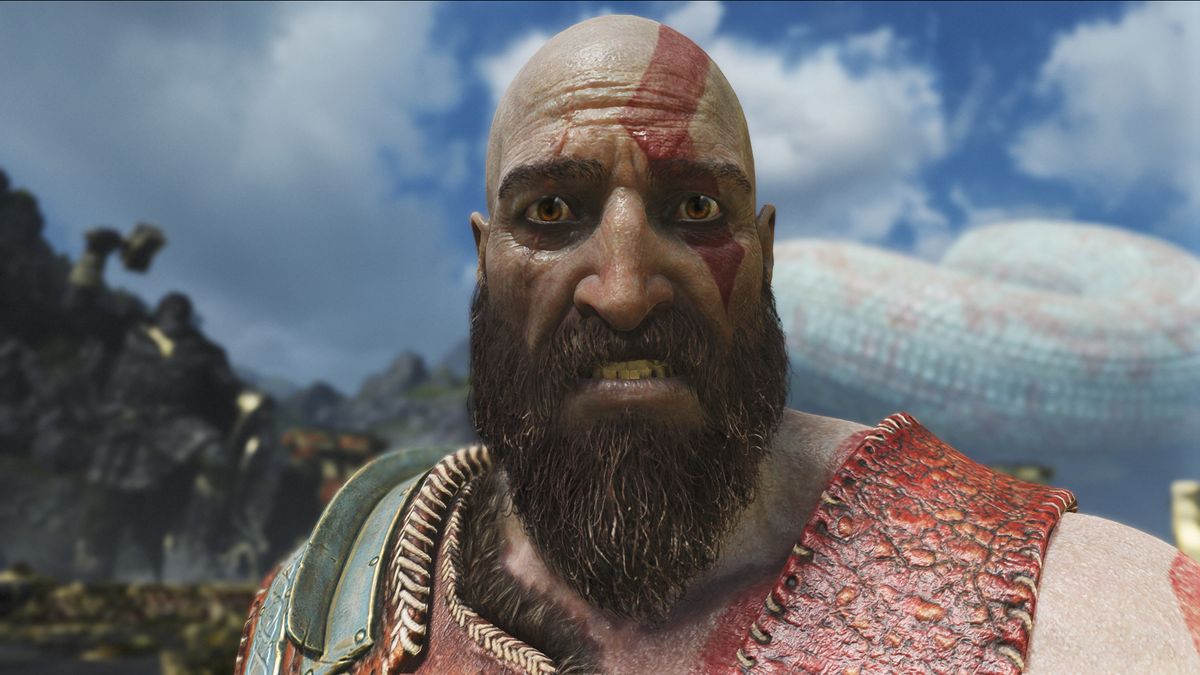From ancient Greek mythology, to Viking legend, the God of War series has it all. Somehow the devs at Sony managed to use the games’ main character, Kratos, to weave two disparate pantheons into something that’s not only mostly coherent, but immensely gripping. Of course, much of it needed to be pulled apart and stitched back together in order to achieve something unique and intriguing—but who needed another carbon-copy of the Greek myths? Not us.
What we wanted was a jumble of epic tales, loosely tied around everyone’s favourite dad of war, and that’s what we got. But the real interest for me—aside from how brutally he plans to embed his weapon into the skull of his next enemy—is where this guy really came from.
Turns out Kratos’ origin story isn’t as cut and dry as you might expect. And in case you still haven’t played through the series, here’s your obligatory spoiler alert. Seriously: Don’t read on unless you’ve finished the games or don’t care.
In his Greek origins, ‘Cratos’ was but a cameo throughout the expansive mythos. He was not the chastised son of Zeus, but instead the son of Pallas, the titan god of battle and warcraft. His mother was Styx, the titan goddess of hatred and oaths; Styx being the goddess from whom the underworld’s river Styx takes its name.
Kratos actually encounters the river named after his real-life counterpart’s mother several times during his trudging, but the river doesn’t appear to hold the same mystical powers as it does in Greek mythology, i.e. making demigods invulnerable.
OG Cratos is most well known for his role in Aischylos’ Prometheus Bound, as the personification of might. There he shit-talks Hephaestus to his face much as he does in the third game, although the original legend has him attempting to convince the blacksmith god that Prometheus deserves Zeus’ wrath for gifting “the bright and dancing fire” to mankind. By contrast, it was Kratos who released Prometheus from his daily liver-pecking torment in God of War II.
These kind of discrepancies send some mixed signals, but interestingly, sources suggest the game character was only named as such late into the first game’s development stages, after much of his character had already been fleshed out. Apparently the devs chose the name simply because it was the Greek word for strength.
Kratos’ journey begins closer to that of Heracles/Hercules from Greek mythology, one of Zeus’ more popularly depicted sons. In the legends, Hercules is the one who freed Prometheus, and set out to cleanse himself of his missteps after being tricked into killing his wife and children (albeit by Hera instead of his father).
Kratos does serve the gods for some time, though admittedly takes more of a vengeful approach than Hercules toward the end. Instead of finally being welcomed into the halls of Olympus, he goes about murdering everyone who stands between him and his plan to take down his tricksy father.
In Roman times, the word Kratos was actually the Greek translation of the Latin word ‘imperium.’ It refers to “the absolute power to command and be obeyed without question,” sources state. It’s easy to see the devs’ reason for naming him that way. He represents power in its most raw and indisputable form; a strength that underpins the entire series, but manifests in a different light as we move over into Norse mythology.
The patchwork character that is Kratos is then cleverly shoehorned into Norse legend as the father of Atreus, aka ‘boy.’ In Greek legend, he is the son of Hippodamia, and Pelops of Mycenae. Peleops was actually a grandson of Zeus, who’s father served him up as a meal for the gods, and ended up resurrected with a piece missing (his shoulder), which was later replaced by a very apologetic Demeter with ivory. Later, it was Hercules who erected a shrine in his honour at Olympia.
But back to Norse mythology: After finding post-Zeus-murder refuge in Midgard, Kratos somehow takes on the role of king of the Jötunheim Frost Giants, Fárbauti, and sires a son with Faye/Freya/Laufey, the goddess of love, beauty, fertility, and magic.
As it turns out, Atreus is actually the Norse god Loki, who you may know through pop-culture as the shapeshifting, genderfluid trickster god. In the real legends, he is widely considered to have been birthed by Laufey after Fárbauti unceremoniously hit her with lightning.
According to her Wiki page, Laufey’s domain is that of flora, as her name is rooted (pun intended) in the Norse lauf, meaning leaves or foliage, and ey, meaning island or good fortune. Opposites attract, as they say, with the name Fárbauti meaning dangerous hitter, or cruel striker. Which, while appropriate for Kratos’ character, is said to relate to the idea that striking foliage creates fire.
That fire being Loki—a very spicy character indeed.
So while there are a muddle of stories surrounding Kratos, and the many roles he embodies, there’s one sure success for the developers of the God of War series: keeping the legends alive.
Sure they’re all mixed up, but they tease you with these questions, and encourage you to do your own research into the ancient legends—so you can feel not only like a grumpy spartan, but a scholar as well.
